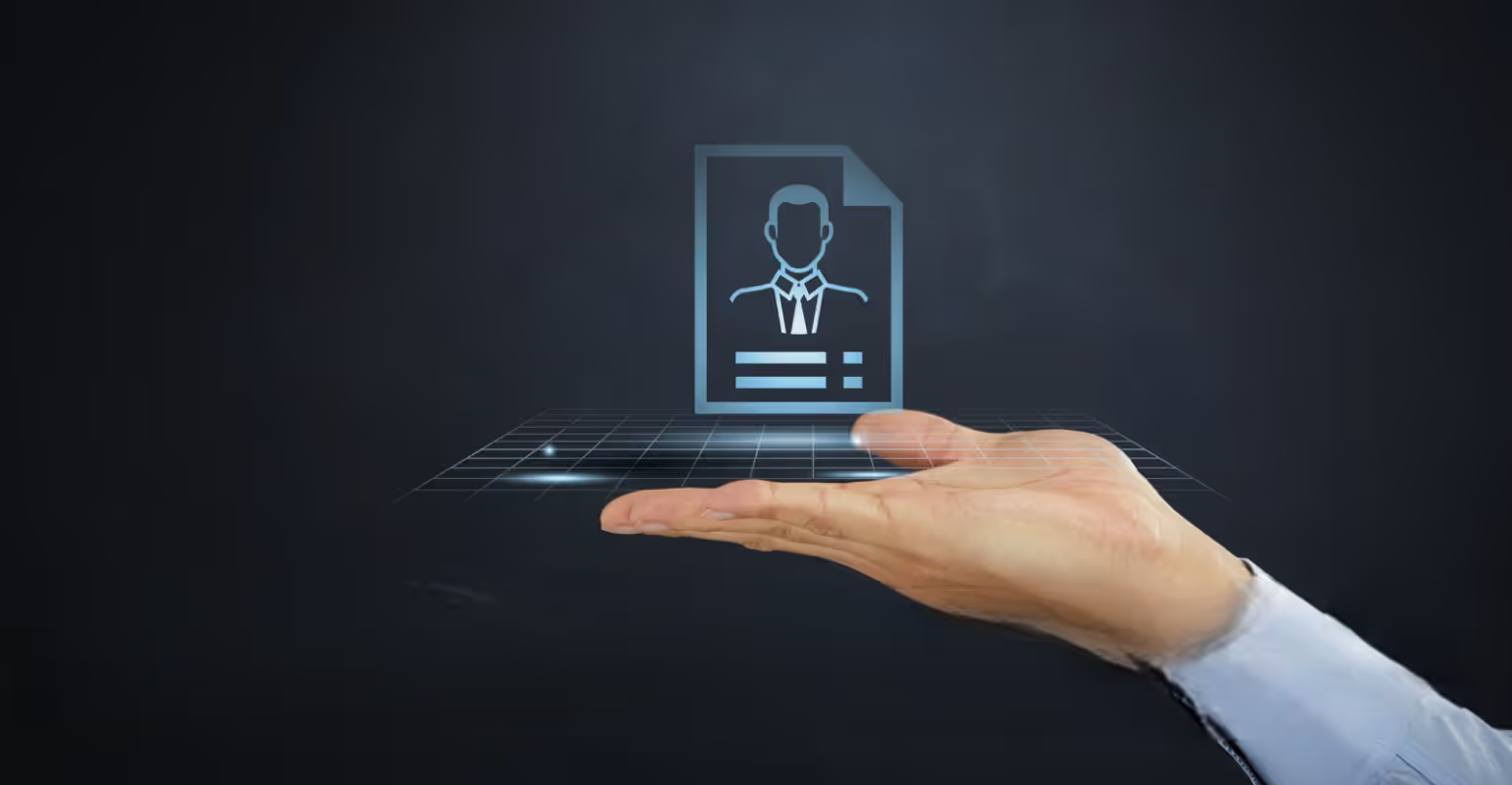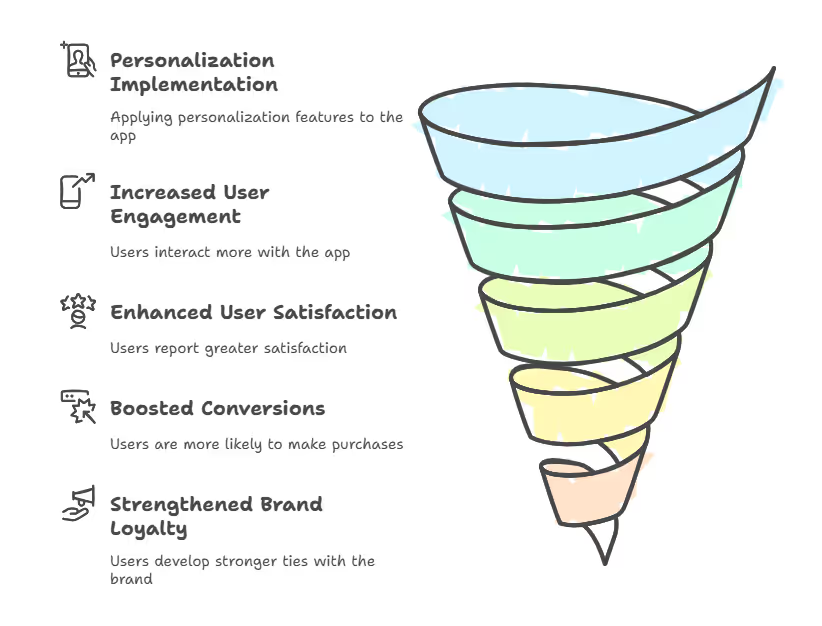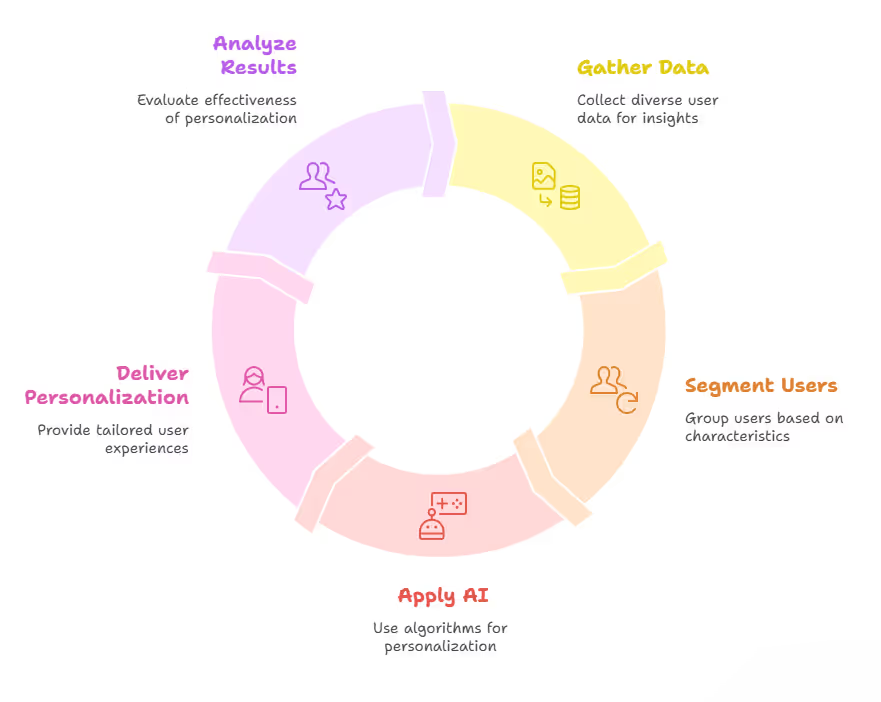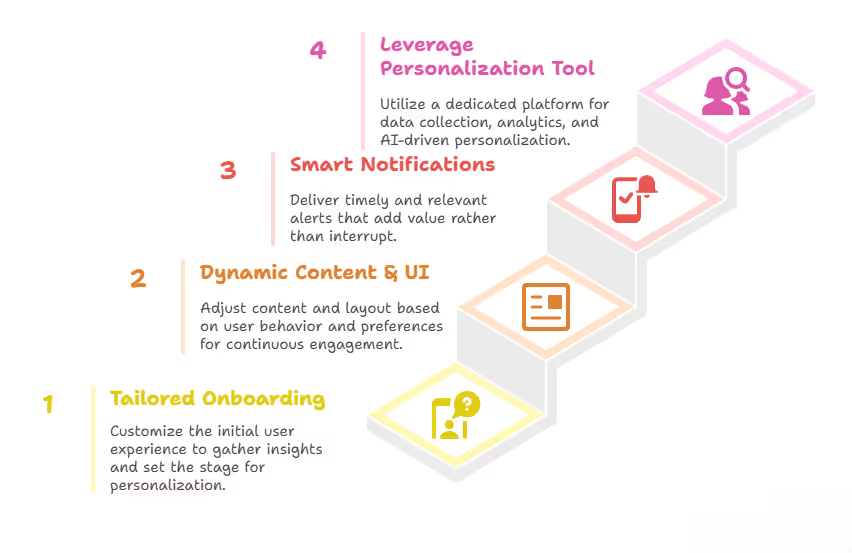Mobile App Personalization Examples for Better User Experience

In today’s competitive app economy, personalization has become the key differentiator between apps that thrive and those that struggle. U.S. users now expect experiences tailored to their preferences, behaviors, and locations, much like Netflix recommending the right shows or Starbucks suggesting your favorite order. This blog explores real-world mobile app personalization examples that product managers, marketers, and developers can use to create meaningful connections with their users.
Mobile app personalization examples include customized onboarding flows, AI-driven content recommendations, personalized push notifications, location-based offers, and in-app messaging tailored to user behavior. These strategies help U.S. businesses boost user engagement, improve retention, and increase lifetime value.
Table of Contents
- What Exactly is Mobile App Personalization?
- Why Your Enterprise App Needs Personalization: Real Business Impact
- Under the Hood: How We Build Mobile App Personalization (The Tech Stack)
- How to Implement Mobile App Personalization in Your Enterprise App (Strategies That Work)
- The Road Ahead: Challenges & Best Practices for Enterprise Mobile App Personalization
- Real-World Impact: Mobile App Personalization Examples
- Your Path to a Hyper-Personalized Future: Let's Build It Together
What Exactly is Mobile App Personalization?
Many people confuse personalization with "customization." Let me clear that up based on what I've seen building these systems:
- Customization is user-driven. You, as the user, actively go into settings and change something. Think of picking a dark mode theme or arranging icons on your home screen. You control it.
- Personalization is app-driven intelligence. The app itself intelligently adapts to you. It learns your habits, preferences, and situation, then dynamically changes its content, features, or even its layout, all on its own. It's proactive, often subtle, and incredibly powerful.
Imagine a banking app. Instead of showing generic offers, it highlights specific investment options aligning with your spending patterns. Or a B2B platform that prioritizes workflows based on your typical tasks and role.
This isn't just a convenience; it's about making your users feel truly seen and understood by your technology.
From my side, as a developer, building this intelligence transforms an application from a mere tool into a genuine digital companion.
Why Your Enterprise App Needs Personalization: Real Business Impact
We're all chasing engagement, retention, and revenue.
Here’s how putting effort into building truly personalized mobile experiences directly impacts those critical business goals for large organizations:

Boosting Engagement & Retention with App Personalization
A common challenge I hear: "My enterprise app has good features, but users still churn. Can app personalization really help?"
Absolutely. In the crowded app market, a generic experience is easily forgotten. When an app provides relevant content, smart suggestions, and a flow that just makes sense for the individual, users don’t just use it; they rely on it.
- First-hand observation: I’ve seen that when an app learns a user's habits – like a project management tool highlighting tasks relevant to their current projects, or a corporate learning app suggesting courses based on their career path – it becomes indispensable.
- Increased Satisfaction: Over 52% of consumers report higher satisfaction when experiences become more personalized, according to Segment research. [1]
- Higher Open Rates: Apps using smart, personalized notifications can see an 800% increase in open rates compared to generic ones. That’s not a typo; that's real re-engagement driven by relevance. [2]
Driving Conversions & Revenue Through In-App Personalization
Many business leaders ask: "We need clear ROI. How does in-app personalization directly generate more money for an enterprise?
This is where personalization truly shines. It’s about moving beyond just impressions to actual actions. When your app presents a user with exactly what they’re looking for, or even what they didn't know they needed, the path to conversion becomes frictionless.
- User Preference: 67% of smartphone users are more likely to purchase from companies whose mobile sites or apps customize information to their location.
- Revenue Boost: Companies leveraging personalized marketing can increase revenues by 5% to 15% and boost marketing return on investment (ROI) by 10% to 30%. [3]
- Client Example: For a large retail client, implementing a system that recommended products based on past Browse and purchases within their app didn't just show more items; it directly led to a 15% increase in average order value within personalized user segments. They weren’t just "Browse"; they were buying what felt right for them.
Building Stronger Brand Ties with Personalized Mobile Apps
Another question that comes up: "How does a tech solution like personalized mobile apps build emotional loyalty to a brand?"
It's simple: feeling valued creates loyalty. When your app anticipates needs, makes interactions smoother, and delivers information that resonates, it creates a powerful user experience. This isn't just about functionality; it’s about making the user feel intelligent and efficient.
- Increased Engagement: 80% of consumers say they're more likely to do business with a company that offers personalized experiences. [4]
- The "wow" factor: Imagine opening a complex enterprise resource planning (ERP) app, and instead of a sea of data, it immediately presents the reports most critical to your daily tasks. That’s not just productive; it’s delightful.
- Trust and Advocacy: Users trust apps that consistently provide value. This trust translates into brand loyalty and, eventually, advocacy. Satisfied users become your best advocates, leaving positive reviews and recommending your app to others.
Gaining a Competitive Edge with Mobile Personalization
In a competitive enterprise market, how can mobile personalization truly differentiate your business?
Many apps offer similar features. But few offer truly individualized experience at scale. By investing in advanced mobile personalization, you position your enterprise as an innovator, one that genuinely understands and prioritizes its users.
In a world where every advantage counts, this can be your defining edge, attracting top talent and high-value clients.
Under the Hood: How We Build Mobile App Personalization (The Tech Stack)
From my perspective, developing personalized experiences involves a careful orchestration of data, algorithms, and infrastructure.
It’s not just magic; it’s well-engineered systems.

Data is the Bedrock for App Personalization
You might ask: "What kind of data do you need to make this app personalization work? Is it just basic user info?
Far from it! Think of data as the raw material. The more insights we have, the more nuanced personalization can be.
We gather and analyze:
- Behavioral data: What actions do users take within the app? What do they click on? How long do they stay on certain screens? What do they search for? This is gold for understanding intent.
- Demographic data: Basic info like age, location, and language helps with broad segmentation.
- Explicit preferences: What do users tell us they like (e.g., during onboarding, or through preference settings)?
- Contextual data: What device are they using? What's the time of day? Where are they located (with their permission, of course)? This allows for contextual personalization for apps – adapting the experience to the "now."
Once we have this data, the critical next step is segmentation. We group users with similar characteristics or behaviors. For a large enterprise, this might mean segmenting users by role (e.g., "sales manager," "finance analyst"), region, or even product usage tiers.
This foundational work allows us to apply intelligent rules and machine learning models effectively.
The Brains of the Operation: Personalization AI App & Machine Learning
You might wonder: "Is 'AI personalization' just a buzzword, or is it truly necessary for enterprise apps?"
It's absolutely essential, especially for large, dynamic apps. Rule-based personalization can only go so far. For true scale and intelligence, you need personalized AI app capabilities.
This is where advanced algorithms come into play:
- Recommendation Engines: Think Netflix or Spotify. These use methods like collaborative filtering (users who like X also like Y) and content-based filtering (if you like thrillers, here are more thrillers) to suggest relevant items, content, or features. For a B2B app, this could mean recommending relevant reports or team members to collaborate with.
- Netflix's success: Over 80% of all viewing activity on Netflix comes from these tailored suggestions.
- Predictive Analytics: AI models can analyze historical data to predict future behavior. When might a user churn? What’s the next logical step in their workflow? What offer are they most likely to accept? This is the core of an AI personalization app that learns and anticipates.
- UI Adaptation: We’re even seeing UI personalization in machine learning apps, where the user interface itself dynamically adjusts. For example, frequently used features might be brought to the forefront, or complex dashboards might be simplified based on a user’s historical interaction patterns.
The beauty of AI is its ability to constantly learn and improve. The more data it processes, the smarter and more precise personalization becomes. This allows enterprises to serve truly unique experiences to millions of users without manual intervention.
The Speed Factor: Real-Time Contextual Personalization for Apps
A common query: "Does personalization happen in real-time, or is it based on old data?"
For impactful personalization, especially for enterprise users, it must be done in real time. If a user browses a particular product in a retail app, you want to show them related items immediately, not two days later.
If they enter a specific part of a corporate campus, you want the campus navigation app to suggest nearby resources right then.
This requires robust data pipelines that can process information in milliseconds and instantly update the user experience. It's about delivering contextually relevant experiences in the moment, making the app feel incredibly responsive and intelligent.
How to Implement Mobile App Personalization in Your Enterprise App (Strategies That Work)
Alright, so you’re convinced. Now, how do we actually do this in a large enterprise environment?
Here are some proven strategies:

First Impressions: Tailored Onboarding
Your app’s onboarding process is a golden opportunity.
Instead of a generic tour, make it personal:
- Ask smart questions: For a complex SaaS app, ask about the user’s role, their primary goals, or what problems they want to solve. Then, customize the initial setup and suggest features based on their answers.
- Adapt on the fly: If a new user immediately jumps into a specific feature, the app should learn from that and adjust subsequent tutorials or suggestions accordingly. This sets the stage for a seamless, relevant journey.
Dynamic Content & Fluid UI Adjustments
This is the bread and butter of continuous personalization:
- Content Feeds: Just like your favorite streaming service, an internal news app or a client-facing portal can feature news, updates, or reports most relevant to each user's interests or department.
- UI Layouts: For UI personalization in machine learning apps, certain widgets or dashboards might be prioritized on a user’s home screen based on their most frequent activities. A sales manager might see their pipeline first, while a support agent sees their ticket queue.
- Personalized Recommendations: Beyond products, this could be recommending colleagues for collaboration, relevant training modules, or data insights critical to a user’s current tasks.
Smart Notifications, Not Noise
Generic push notifications are the quickest way to annoy users into muting or uninstalling your app.
Personalization changes this game:
- Behavior-triggered alerts: "You left this report unreviewed," or "Your team member just updated Project X."
- Contextual messages: "Welcome to the NYC office! Here's a map to your meeting room.
- Value-driven offers: For a B2C client, this might be a reminder about items in a forgotten cart, or a special offer based on their recent Browse. For B2B, it could be a notification about a crucial update to a shared document, or a relevant compliance reminder.
The key is to send timely, relevant messages that provide real value, making the notification a welcome alert rather than an interruption.
Leveraging a Mobile App Personalization Tool
You might ask: "Do we have to build all this from scratch? What about off-the-shelf solutions?
You absolutely don't have to build everything from the ground up. For enterprises, it's often more efficient not to do so. A dedicated mobile app personalization tool can be a game-changer.
These platforms typically offer:
- Integrated data collection and analytics.
- Advanced segmentation capabilities.
- Pre-built AI/ML engines for recommendations and predictions.
- A/B testing features to optimize your personalization strategies.
- Crucially, robust APIs for seamless integration with your existing CRM, ERP, and marketing automation systems.
Investing in a powerful platform allows your team to focus on strategy and iteration, rather than getting bogged down in foundational infrastructure.
The Road Ahead: Challenges & Best Practices for Enterprise Mobile App Personalization
No major technology shift comes without its hurdles. From my vantage point, these are the key challenges and how to overcome them:
The Privacy Imperative: Data & Trust
A significant concern often raised is: "With so much data, aren't there major privacy concerns for app personalization? How do we handle that?
This is not just a concern; it’s the non-negotiable requirement. For enterprise, especially in regulated industries, data privacy and security must be paramount.
- Be transparent: Clearly tell your users what data you’re collecting and why. Simplicity in privacy policies is key.
- Get explicit consent: Adhere strictly to regulations like GDPR, CCPA, and industry-specific compliances. Give users granular control over their data.
- Fortify security: Implement state-of-the-art encryption, access controls, and regular security audits. Data breaches don't just cost money; they destroy trust. From a developer's perspective, this means "privacy by design" and constant vigilance.
Avoiding the "Creepy" Factor in App Personalization
A critical balance to strike: "How do we personalize without making users feel like they're being watched?"
This is an art mixed with science. Over-personalization can backfire, making users uncomfortable.
- Focus on value, not just capability: Just because you can use certain data doesn't mean you should. Always ask: "Does this specific personalization genuinely help the user or improve their experience?"
- Offer control: Allow users to easily review or adjust their personalization settings.
- Avoid assumptions: Intelligent predictions are great; spooky, seemingly psychic insights are not.
Scaling & Integrating Personalization Complexities
For large organizations, a frequent question is: "Our enterprise systems are vast and complex. Is personalizing our apps at scale even feasible?"
It's challenging, but absolutely feasible with the right architectural approach.
- Scalability: Your personalization engine needs to handle millions of users and process massive amounts of data in real-time. This often means leveraging cloud-native solutions and microservices architecture.
- Integration: Enterprise apps are rarely standalone. Seamless integration with your CRM, ERP, marketing automation, data warehouses, and other internal systems is critical to creating that "unified customer view" that fuels deep personalization. This is where a good mobile app personalization tool with robust APIs becomes your best friend.
Best Practices for Mobile App Personalization Success: My Blueprint
Having navigated many enterprise personalization projects, here are my top takeaways:
- Start Small, Learn Fast: Don’t try to personalize everything at once. Pick a few high-impact areas, implement, measure, and then iterate. This agile approach minimizes risk and maximizes learning.
- User-Centric First: Always ask, "How does this personalization benefit the user?" If you can't answer that clearly, rethink it.
- Unified Data: Break down data silos. A 360-degree view of your customer across all touchpoints is essential for truly intelligent personalization.
- Test, Test, Test: A/B testing is your secret weapon. Continuously test different personalization strategies to see what resonates best with different user segments.
- Cross-Functional Collaboration: Product teams, development teams, marketing, and business stakeholders must work together. Personalization isn’t just a tech task; it’s a business strategy enabled by tech.
- Ethical Foundation: Build trust through transparent data practices. It's not just about compliance; it's about reputation.
Real-World Impact: Mobile App Personalization Examples
Let's look at some leading mobile app personalization examples that demonstrate the power of these strategies:
- Netflix & Spotify: We all know these. Over 80% of content consumed on Netflix comes from its personalized recommendation engine. Spotify's "Discover Weekly" and "Daily Mix" playlists feel like they were made just for you, driving immense engagement.
- Starbucks: Their app learns your favorite drinks, typical order times, and even your location to offer personalized promotions and loyalty rewards. This isn't just a coffee app; it's your coffee app.
- Calm & Duolingo: These apps show how personalization enhances learning and wellness. Calm asks about your goals (e.g., "better sleep") during onboarding to tailor meditation programs. Duolingo adapts lessons and difficulty based on your performance, making learning feel natural and effective.
- Enterprise-level examples (often less public, but powerful): I’ve worked on internal tools where personalized dashboards for sales teams immediately highlight their top-priority accounts, or manufacturing apps that present relevant machine health alerts to specific technicians based on their shift and expertise. These efficiencies, though not consumer-facing, save millions and optimize operations significantly.
These aren't just features; they're experiences that build habit and loyalty because they anticipate and serve individual needs so effectively.
Your Path to a Hyper-Personalized Future: Let's Build It Together
As I've shared, personalization in mobile apps isn't just a strategic advantage; for enterprises, it's becoming a foundational requirement for growth and relevance.
It's about building apps that don't just exist but thrive by deeply understanding and serving their users.
From my seat, having built and seen these systems come to life, I can tell you that the power of personalized mobile apps to drive engagement, conversions, and lasting loyalty is immense.
It transforms your digital touchpoints into intelligent, empathetic extensions of your brand.
Ready to move beyond generic apps and unlock the full revenue-generating potential of a truly personalized mobile experience?
Don't let your competitors get there first. Let’s connect and strategize how your enterprise can leverage cutting-edge personalization to redefine your mobile presence and achieve your most ambitious business objectives.
This isn't just about another feature; it's about building a smarter, more valuable future for your business through technology.

